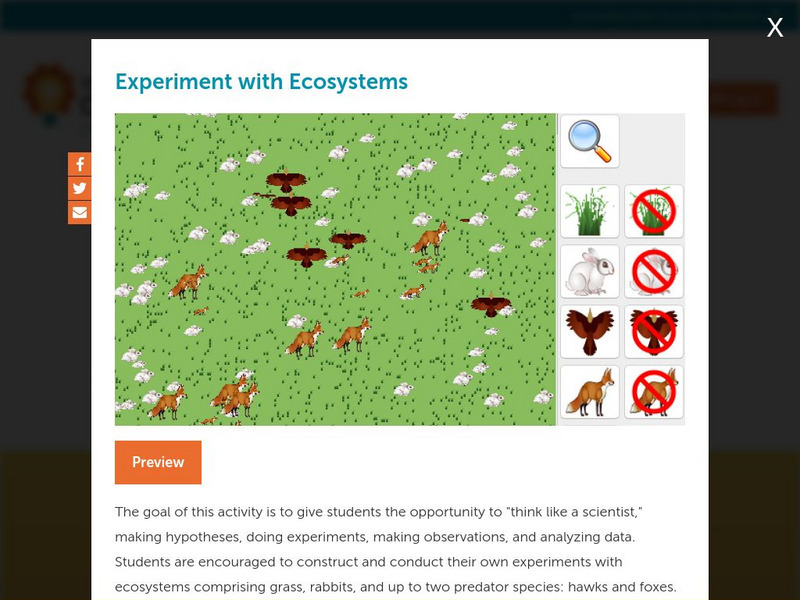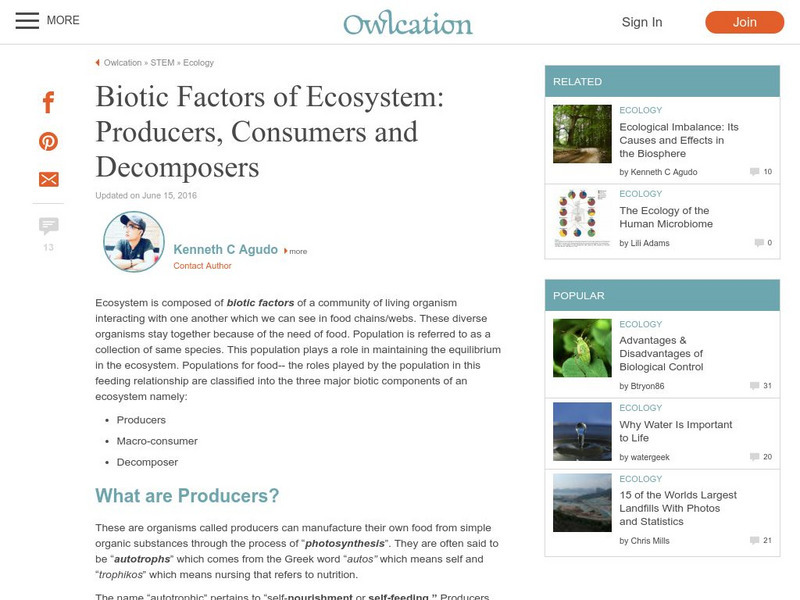Hi, what do you want to do?
Curated OER
Designing Our Own Inventions
Third graders use research from a previous lesson to design their own inventions. In groups, they brainstorm a product they would like to see built and share them with the class. They must explain how each one would serve a purpose or...
Curated OER
EcoKids Web Site: Food Chain Game
Students use the EcoKids web site to explore food chains and the associated terminology. They answer the questions about food chains and their importance. Students use the Kidspiration program to add information to an Animal Fact Web.
Curated OER
Coarl Reef Degradation
Students explore methods of preserving Hawaii's ocean ecosystem. Using underwater cameras, students take pictures of the underwater reef. They perform activities to determine the history and degradation of the coal reef. While...
Curated OER
What does AG have to do with me?
Young scholars practice alphabetizing while categorizing sources of basic agricultural products. They discuss agricultrual products, discover where they are grown and draw a simple agricultural scene on poster board.
Curated OER
Environment: The Haves and the Have Nots
Students examine consumption habits in developed and developing countries and determine their effects on natural resources. In groups, they assess graphs on the Living Planet Report and observe the connection between consumption and...
Curated OER
Water Quality Monitoring
Students comprehend the four parameters of water quality. They perform tests for salinity, dissolved oxygen, pH and clarity or turbidity. Students comprehend why scientists and environmental managers monitor water uality and aquatic...
Curated OER
The History of Ethanol in America
Sixth graders explore and examine the production of biofuels from the 1850's to the present. Included in their research is Henry Ford, ethanol, World War I and prohibition. They explain the importance of grains and grasses for the...
Curated OER
Sp. Lesson 23
In this literacy activity, students find the words that are part of a literacy review. The answers are found by clicking the button at the bottom of the page.
Curated OER
Worksheet #5, Concavity,
For this calculus worksheet, students determine the intervals in which a given relation is concave up. They determine the inflection points of a given formula. Students use the second derivative test to classify the relative extrema of a...
Curated OER
Theatre Lesson Plan
Second graders complete pantomime and improvisational theatre activities. In this theatre lesson, 2nd graders play a 'sound ball' game and recreate sounds as they toss the ball. Students discuss projection for an actor and practice the...
Curated OER
A Sense of West Virginia
Students consider their perceptions of the world through their 5 senses while visiting the West Virginia State Museum. In this West Virginia history lesson, students discover how knowing about the past helps with their understanding of...
Curated OER
Animal Electronic I.D.
Students discover ways to keep the animals in our environment safe by examining electronic I.D. tags. For this animal safety lesson, students participate in a role-playing activity in which they are monitored by an electronic I.D....
Curated OER
Puberty
Eighth graders describe the changes their body undergoes during puberty. In this health science lesson, 8th graders explain how the hypothalamus and pituitary gland play a major role in the process. They identify the different parts of...
Curated OER
Food Travels and Preservation
Fourth graders study food processing and distribution. In this food processing lesson, 4th graders investigate various methods of food preservation. Students study methods of food distribution.
Curated OER
Spelling List 7: Sight Words, al/el, and Academic Vocabulary
In this spelling worksheet, students copy a set of 21 words two times each. Words are sight, academic or have the al/el sound. A website reference is given.
Curated OER
Physics at the Zoo
Learners visit a local zoo and answer physics questions that are a part of zoo life. In this zoo physics instructional activity students answer questions that have to do with the physics of animal size, their center of gravity and...
Science Education Resource Center at Carleton College
Serc: Investigation a Food Web: Producers, Consumers, and Decomposers
Being field scientists, students will explore a wooded area in their community and journal about their observations. Students will collect information about producers, consumers, and decomposers in the ecosystem. They will then construct...
Sheppard Software
Sheppard Software: Parts of the Food Chain: Producers, Consumers, Decomposers
Learn how scientists classify different types of organisms in an ecosystem or in a food chain by their role and function as either a producer, a consumer, or a decomposer. Then play a game that tests your understanding of these important...
Sophia Learning
Sophia: Producer and Consumer Surplus
By using notes and supporting videos, tutorial helps students to acquire an understanding of producer and consumer surplus and to be able to calculate it.
Concord Consortium
Concord Consortium: Stem Resources: Experiment With Ecosystems
Learn what happens to different populations of organisms as their ecosystem changes. Design your own experiment and make your own guesses with what the result will be with this virtual ecosystem. Also experiment with producer/consumer...
Council for Economic Education
Econ Ed Link: What Does the Nation Consume?
This lesson plan will focus on what the nation consumes and how that is measured by Gross Domestic Product (GDP). In the United States, the goods and services produced for household consumption account for about two-thirds of total output.
Alabama Learning Exchange
Alex: Producers and Consumers
This instructional activity will teach the difference between producers and consumers. It provides an interactive way for students to get involved and actually become producers and consumers.
CK-12 Foundation
Ck 12: Episd: Consumers and Decomposers
[Free Registration/Login may be required to access all resource tools.] Based upon the way organisms acquire their energy students will understand how to group them as consumers, decomposers or producers.
Other
Hub Pages: Biotic Factors of Ecosystem: Producers, Consumers and Decomposers
An ecosystem is composed of biotic factors of a community of living organisms interacting with one another which we can see in food chains/webs. These diverse organisms stay together because of the need of food. Population is referred to...
Other popular searches
- Consumers and Producers
- Science Producers Consumers
- Producers and Consumers Poem
- Marine Producers Consumers
- Producers Consumers Writing
- Consumers Producers
- Consumers, Producers




























